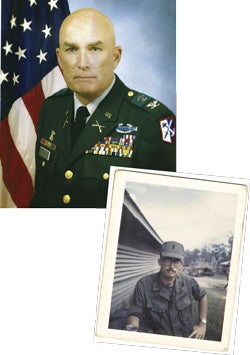Helping Veterans Find Peace at Home

Retired Army National Guard Colonel Bill Babcock ’68, M.A. ’72, served in three wars during his decorated military career—Vietnam, Iraq, and Afghanistan. But it took a few peacetime encounters before he gave post-traumatic stress disorder (PTSD) a second thought.
First, Babcock reconnected with a troubled URI classmate and fellow Vietnam veteran. At the same time, he was witnessing the trauma young soldiers in his unit were experiencing in Iraq. And finally, he was hearing from his sons that some of their classmates who served in Iraq were experiencing issues. “That’s when it became personal,” the colonel said.
Veterans experiencing PTSD often return home unable to cope with civilian life and some run into trouble with the law as a result. Recognizing that this vulnerable population needs help, not incarceration, Babcock is volunteering to lead the new Volunteer Mentor Program in Rhode Island’s Kent County District Court. Initiated by Chief Judge Jeanne E. LaFazia, the program helps veterans facing misdemeanor criminal charges.
Similar programs, first established in Buffalo, N.Y. in 2008, are being replicated across the nation. These low-cost programs seem to be working, as recidivism rates are dramatically low.
The R.I. program diverts veterans and others diagnosed with trauma and service-related disorders into an alternative sentencing program, and places them in a 12-week treatment program followed by a minimum of six months of court reviews.
Babcock will match each veteran with a volunteer veteran mentor who will serve as a buddy and resource. If the offending veteran stays out of trouble for a specified period of time, his or her criminal record may be dismissed or reduced.
With the Afghanistan war scaling down and the military being trimmed, veterans are pouring back into civilian life in record numbers. “I have no doubt that the number of soldiers coming home with PTSD will increase, as will the need for these kinds of courts,” the colonel said.
Listen to an interview with Colonel Babcock. Part of “The Whole World Was Watching: An Oral History of 1968.”
 Home
Home Browse
Browse Close
Close Events
Events Maps
Maps Email
Email Brightspace
Brightspace eCampus
eCampus


